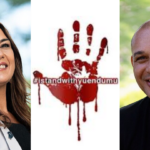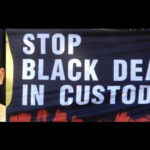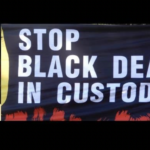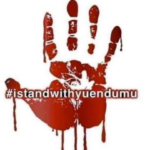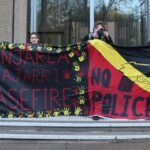Kumanjayi White’s Killing Has Shifted the Debate on the Aboriginal Deaths in Custody Crisis
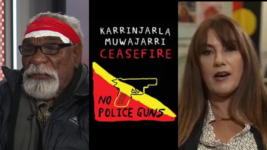
As thousands protested the violence of the Australian system across the continent over the weekend, which has yet again led to the death of another Aboriginal person in custody, there appeared to be a shift in the position taken by those gathered to contest the killing of Warlpiri man Kumanjayi White at the hands of two plainclothes police officers in Coles Alice Springs on 27 May 2025.
Perhaps it was the callous manner in which the two cops set upon the 24-year-old man with disabilities, perhaps it was that this is the second young Warlpiri man from Yuendumu to have been violently killed by police in recent years, or perhaps it’s the parallels between the Israeli state violence occurring in Gaza and that of this state, but regardless of what it was, a shift has occurred.
The message was clear at the rallies that sprung up at over a dozen urban centres across the country: the Australian police violence reserved for First Nations people is endemic and the Aboriginal deaths in the custody of police or corrections that accompany it, aren’t isolated incidents but are common occurrences, and the myths that served to convey otherwise are falling down.
Due to his disabilities, Kumanjayi White was living in assisted state care in Mparntwe-Alice Springs away from his hometown of Yuendumu, which has a population of 870, and it was also the home of 19-year-old Warlpiri teen Kumanjayi Walker, who was shot dead by former Northern Territory police officer Zachary Rolfe on 9 November 2019, with the related coronial report set to be released soon.
The demand repeated at each of the rallies last weekend was, unlike Walker’s death, the investigation of White’s ought to be conducted independent of Northern Territory police, which was a call federal Indigenous affairs minister Malarndirri McCarthy made last week, which was another occurrence that marked a change in the reaction that’s come to be expected in the wake such deaths.
Karrinjarla Muwajarri
“The government should look at the situation with the police and what they are doing to us,” Warlpiri elder Uncle Ned Jampijinpa Hargraves told the ABC on Monday. “If we want the police to say sorry to us…. We would like to say, ‘We want you to drop the guns – drop it’…. How much more do we have to go on like this. It’s got to stop somewhere along the line.”
“You want to say sorry? You take the belt off. You take the guns off,” said Uncle Ned, who is the grandfather of Kumanjayi White. “We cannot keep living like this. I would say this, ‘Get off our back. Get off our back’”.
According to the brief reports on the circumstances, it appears White was being approached by shop security over potential shoplifting, when two plainclothes police officers took over. A witness reported that one of the officers had their knee on the back of the man’s neck, which suggests they had him on the ground in the potentially lethal prone position.
Prior to the brutal killing of his jaja-grandson Kumanjayi, Uncle Ned was already well known, as in the wake of the March 2022 acquittal of former NT police constable Rolfe over the shooting death of Kumanjayi Walker in a family home in Yuendumu, the Warlpiri elder launched the Karrinjarla Muwajarri campaign, which called for a ceasefire and an end to police guns in remote communities.
Rolfe shot Walker three times. The second and third time involved firing directly into the side of the teen’s ribcage as he was on his back on the ground with the constable’s partner on top of him.
The constable was then charged with a sliding scale of offences: firstly murder, which if he was not convicted of was then backed up by a charge of manslaughter, and then still if that failed, he had a third count of violent act causing death laid against his name. However, the all-non-Indigenous jury acquitted him of all three crimes.
Uncle Ned explained to Sydney Criminal Lawyers after the launch of the ceasefire campaign that since the Howard government launched the NT Intervention in 2007, police violence in remote communities has escalated, which followed Canberra having sent in the army to secure dozens of the Aboriginal communities, which are now patrolled by police brandishing military-style weapons.
“The Intervention has torn us apart. It ripped us apart,” Uncle Ned said in a June 2022 interview. “Intervention hasn’t given us an opportunity. Intervention hasn’t given us freedom of will or our rights to carry on the way we want to live. We want to run our community in the way that suits us. We want to run our community and to live in peace.”
A crisis down the decades
But even as the outpouring of protests continued, it came to light on Saturday that another Aboriginal death had occurred in custody in the Northern Territory. This time it involved a 68-year-old Aboriginal man, who was allegedly too drunk to board a flight at Darwin airport, and in response to a call, he was taken into custody by the Australian federal police on 30 May.
The AFP took him into custody under the terms of section 128 of the Police Administration Act 1978 (NT), which allows law enforcement officers to take people intoxicated in public into custody if they may cause harm to themselves or others.
But after arriving at the watchhouse, it was decided the elderly man should be taken to the hospital in Garramilla-Darwin, and during the trip in the police van, the man is said to have lost consciousness. The man was then placed in the intensive care unit, where he never recovered and passed away last Saturday.
The fact that two Aboriginal deaths in custody have occurred over the last fortnight in the Northern Territory again reveals just how often these custody deaths actually occur – deaths that the authorities always conclude are no one’s responsibility and often fail to identify the cause of. At present both Kumanjayi’s and the elderly man’s cause of death are yet to have been determined.
Since the Royal Commission into Aboriginal Deaths in Custody handed down its final report in 1991, which made 339 recommendations on how to prevent these custody deaths that were also a crisis in the 1980s, 597 more deaths of First Nations people in the custody of police or corrections have occurred.
So far this year, 36 deaths have taken place in the custody of police or corrections. Twelve of these deaths were of First Nations people, while 24 were of the non-Indigenous. So, a third of all custodial deaths in 2025 have been of Aboriginal and/or Torres Strait Islander peoples, yet they only account for 3.8 percent of the overall population of this continent.
And despite making up less than four percent of the country’s populace, 36 percent of the nation’s adult prisoner population is made up of First Nations inmates.
Resounding calls for independence
National Justice Project director George Newhouse is the lawyer representing the White family. He spoke at the rally for Kumanjayi White on Gadigal land at Sydney Town Hall on Saturday night, as he was fresh back from Yuendumu, and he read out a statement from the family.
The White family are calling for the Northern Territory police officers involved in the killing to be stood down during the investigation, that the inquiry be carried out by a body independent of the NT police, that all relevant CCTV footage and any potential body cam footage be released to the family, and that police should stop making statements that serve to criminalise the deceased man.
Following minister McCarthy’s call for an independent inquiry into the death, reactionary NT Country Liberals chief minister Lia Finocchiaro, who, since being voted into office last August, has gone on a law-and-order lawmaking binge, which ultimately targets First Nations people, responded that the senator’s call for an independent inquiry was “really unhelpful” and “uneducated”.
However, Senator Lidia Thorpe has pushed McCarthy to keep up with her demand for an independent inquiry, and both senators have noted that the town of Yuendumu has suffered multiple traumas over recent years.
Thorpe’s demand upon the minister, who has since gone silent after her first call for an independent investigation, to continue to push for a change to how the inquiry is carried out became the central demand of all those rallying to mark the killing of White across the continent over last weekend.
A Gunnai, Gunditjmara and Djab Wurrung senator, Thorpe told the ABC ahead of last Friday’s rally for Kumanjayi White in Naarm-Melbourne, “We’ve had so many deaths in custody, in fact almost 600 deaths in custody, with nobody ever held accountable for any of those deaths.”
“We need to enact that Royal Commission recommendation from 1991, which clearly states that we need independence of accountability of these killings – these police killings, and that’s basically what they are.”


